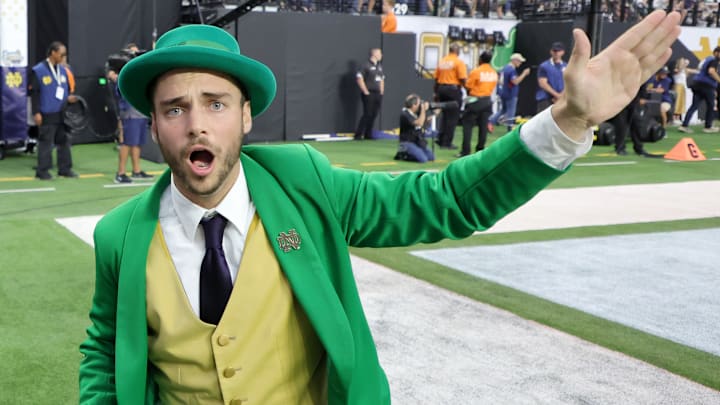The Notre Dame Fighting Irish will play the first game of the 2023 college football season in Week 0, renewing a rivalry with the Navy Midshipmen. More importantly, though, the game will be played in Dublin, Ireland for the Aer Lingus College Football Classic.
This matchup, which is the third time that these two programs will have met in Ireland, is actually a rescheduled meeting between the teams from the COVID-altered and shortened 2020 college football season that prevented them from traveling overseas. But now they'll play in 2023 with a 2:30 p.m. ET kickoff -- or a night game in Dublin.
Given that Notre Dame's mascot and nickname is the Fighting Irish, it stands to reason why they would be playing in Ireland for the third time. However, that doesn't answer a simple question: Why is Notre Dame Irish? Where did this nickname and the background come from?
If you're wondering that same question while watching Marcus Freeman's team in Dublin, we have you covered.
Why is Notre Dame Irish? Ireland game, mascot name, explained
The simplest answer is that there aren't any certain reasons why Notre Dame became so closely associated with the Irish or Ireland. Perhaps it all began in 1842 when the university was founded by six Catholic priests, four of whom were Irish.
As noted by Notre Dame's official website, the "Fighting Irish" moniker was originally used to describe Union soldiers in the Civil War who were Irish immigrants. As for the school's athletics teams, though, there are many theories about when they became known as the Fighting Irish.
The university highlighted one legend that dates back to a 1909 football game against longtime rival Michigan in which a player said "What's the matter with you guys? You're all Irish and you're not fighting worth a lick" to his Irish teammates during a halftime speech.
But the university also purported another theory from historian Murray Sperber that the name spawned from newspapers in the 1910s and 1920s referring to sports teams as "the Catholics" or even derogatory terms like the "Dirty Irish" given the university's high population of Irish Catholic immigrants.
Legendary head coach Knute Rockne may have had the most to do with the "Fighting Irish" nickname catching on, however. Though he wasn't Irish himself, the stereotypes about the student population and players on the football and other athletic teams along with press agents writing about the team began calling them the "Fighting Irish" due to their spirited underdog fight that was shown on the field of play under Rockne. Once derogatory, students, fans and players began to eventually embrace it as their own.
So that's the story, from the university itself and it's history. There are several other minor turns along the way but, since about 1927 when it was officially deemed as the preferable nickname among the many at the time, Notre Dame has been connected to the Irish and has embraced it. It's certainly not a direct tie to Dublin, by any means, but it's the true origins nonetheless.
